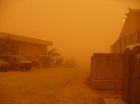(Press-News.org) Contact: Michael Bernstein
m_bernstein@acs.org
714-765-2012 (Meeting, March 27-31)
202-872-6042 (Before March 27)
Michael Woods
m_woods@acs.org
714-765-2012 (Meeting, March 27-31)
202-872-6293 (Before March 27)
American Chemical Society
US troops exposed to polluted air in Iraq, researchers report
ANAHEIM, March 30, 2011 — Military personnel and contractors stationed in Iraq risk not only enemy gunfire, suicide bombers, and roadside bombs, but the very air they breathe often is polluted with dust and other particles of a size and composition that could pose immediate and long-term health threats, scientists reported today at the 241st National Meeting of the American Chemical Society.
Their ongoing study, begun in 2008, indicates that personnel in Iraq often breathe air polluted with the most worrisome kind of dust particles — fine particles, or "particulate matter," that lodge deep inside the lungs. It is the first long-term study of the situation, with previous studies lasting less than a week.
"Our preliminary results show that the fine particulate matter concentrations frequently exceed military exposure guidelines and those individual constituents, such as lead, exceed U.S. ambient air quality standards designed to protect human health," said Jennifer M. Bell, a member of the research team. In some instances, military personnel breathe in fine particulates at levels almost 10 times higher than the desirable levels in U.S. National Ambient Air Quality Standards.
Bell explained that there is an important distinction between the familiar coarse particles that people typically associate with dust and the invisible fine and ultra-fine particles that are the source of most concern about particulate air pollution.
"Coarse particles are large enough to get trapped in the hair-like fibers that line the nasal passages and the trachea preventing them from entering the lungs," she said. "Fine and ultra fine particles are so small that they bypass the body's natural defenses. When we take a breath, they travel into the deepest part of the lung where oxygen exchange takes place."
Chronic exposure to such fine particulate matter has been linked with a variety of health problems, said Bell, who is with the University of Alaska, Fairbanks. Those include increased hospital admissions, premature death among people with heart and lung disease, an increased incidence of cardiovascular disease, and chronic respiratory diseases in children.
Bell cited two main sources of the particles — nature and human activity. Iraq has about two major dust storms a month, with the typical event involving dust and sand whipped up and driven across the landscape by winds that reach 60 miles per hour.
The terrible storms can last for days, with dust seeping through tightly sealed doors and windows and into vehicles and buildings. Those particles contain natural silicates, sulfates, and other minerals that can cause lung damage.
"We are especially concerned about fine airborne particles that originate from motor vehicles, factories, open burning of trash in pits, and other sources," Bell said. Iraq does not enforce air pollution controls, and domestic motor vehicles burn the leaded gasoline was phased out in the United States in the mid-1990s. Those particulates contain potentially toxic heavy metals like lead, arsenic, mercury, and cadmium, she noted. Some of the particulates start out as aerosols, droplets of liquid from automobile tailpipes, for instance. The liquid evaporates, leaving invisible particles of lead and other material that can float for days in the air.
Bell noted that soldiers generally are in excellent health and most probably would not experience any immediate health effects. Some, however, have developed chronic coughs related to the dust. In addition, there is no way of knowing what long-term health effects, if any, may result from troops breathing the dust-laden air.
INFORMATION:
The study was funded by The Battlefield Environment Division Grants from the Computational and Information Science Directorate, U.S. Army Research Laboratory.
The American Chemical Society is a non-profit organization chartered by the U.S. Congress. With more than 163,000 members, ACS is the world's largest scientific society and a global leader in providing access to chemistry-related research through its multiple databases, peer-reviewed journals and scientific conferences. Its main offices are in Washington, D.C., and Columbus, Ohio.
US troops exposed to polluted air in Iraq, researchers report
2011-03-31
ELSE PRESS RELEASES FROM THIS DATE:
Questions About Otoplasty
2011-03-31
What is otoplasty?
Otoplasty is a plastic surgical procedure in which your ears are reshaped and reduced in size. Also known as "ear pinning," otoplasty reshapes the cartilage in your ears to give them a natural look that is more suited to the contours and size of your entire head.
Can children have otoplasty surgery?
Children as young as six years old can have otoplasty surgery. It is not recommended that children have otoplasty prior to this age because their ears are still developing. Teasing and name-calling can have a tremendously negative affect on your child's ...
Fast-recharge, lithium-ion battery could be perfect for electric cars
2011-03-31
Contact: Michael Bernstein
m_bernstein@acs.org
714-765-2012 (Meeting, March 27-31)
202-872-6042 (Before March 27)
Michael Woods
m_woods@acs.org
714-765-2012 (Meeting, March 27-31)
202-872-6293 (Before March 27)
American Chemical Society
Fast-recharge, lithium-ion battery could be perfect for electric cars
ANAHEIM March 30, 2011 — The next-generation battery, like next-generation TV, may be 3-D, scientists reported here today at the 241st National Meeting and Exposition of the American Chemical Society (ACS). They described a new lithium-ion ...
Myths and Facts Regarding Child Support Obligations in Virginia
2011-03-31
Many myths and misconceptions abound regarding child support. Some may come from the fact that different states have different laws regarding child support; others may come from experiences people have had in the past that are no longer relevant due to changes in the law. Below are some commonly-held beliefs -- some true, some false -- about child support.
Belief: There is an enormous backlog of unpaid child support.
This is true. In Virginia alone, custodial parents are collectively owed $2.6 billion in past-due child support.
Belief: Once child support amounts ...
Drug cocktail offers new hope for hepatitis C patients
2011-03-31
A three-drug cocktail can eliminate the hepatitis C virus in patients far more effectively than the current two-drug regimen, according to researchers at Henry Ford Hospital.
"This study represents a remarkable advance and a potential cure for people with hepatitis C who have not responded to previous therapy," says co-author Stuart C. Gordon, M.D., section chief for the Division of Hepatology at Henry Ford Hospital.
"We will soon have a new standard of treatment for hepatitis C patients," says Dr. Gordon. "This study ushers in a new era of drug development that will ...
Death anxiety prompts people to believe in intelligent design, reject evolution: UBC research
2011-03-31
Researchers at the University of British Columbia and Union College (Schenectady, N.Y.) have found that people's death anxiety can influence them to support theories of intelligent design and reject evolutionary theory.
Existential anxiety also prompted people to report increased liking for Michael Behe, intelligent design's main proponent, and increased disliking for evolutionary biologist Richard Dawkins
The lead author is UBC Psychology Asst. Prof. Jessica Tracy with co-authors Joshua Hart, assistant professor of psychology at Union College, and UBC psychology ...
Woman Dies in Dry Cleaning Accident in New York
2011-03-31
A woman was crushed to death at the dry cleaner where she worked. Limin Min Huang was loading towels into an industrial steamer when her scarf got caught in the machine.
The accident at work left her brain dead.
According to her manager, Huang was looking into the machine and she forgot she was wearing a scarf. The scarf became caught in the machine and it pulled her in before stopping.
There are many dangers associated with working at a dry cleaner. Chemical, fire, and ergonomic-related hazards are all risks connected to the dry cleaning processes. Dry cleaning ...
Nature study shows common lab dye is a wonder drug -- for worms
2011-03-31
This press release is available in Spanish. Basic Yellow 1, a dye used in neuroscience laboratories around the world to detect damaged protein in Alzheimer's disease, is a wonder drug for nematode worms. In a study appearing in the March 30, online edition of Nature, the dye, also known as Thioflavin T, (ThT) extended lifespan in healthy nematode worms by more than 50 percent and slowed the disease process in worms bred to mimic aspects of Alzheimer's. The research, conducted at the Buck Institute for Research on Aging, could open new ways to intervene in aging and age-related ...
The rose-red glow of star formation
2011-03-31
The object dominating this image may resemble a pool of spilled blood, but rather than being associated with death, such regions of ionised hydrogen -- known as HII regions -- are sites of creation with high rates of recent star birth. NGC 371 is an example of this; it is an open cluster surrounded by a nebula. The stars in open clusters all originate from the same diffuse HII region, and over time the majority of the hydrogen is used up by star formation, leaving behind a shell of hydrogen such as the one in this image, along with a cluster of hot young stars.
The host ...
Federal Crackdown on Offshore Accounts Continues
2011-03-31
From President Obama's earliest days in office, he made it clear that the administration would crack down on people who had previously evaded taxes through undeclared offshore bank accounts. To encourage people with undeclared accounts to come forward voluntarily, the administration offered a limited amnesty program.
Through the amnesty program, individuals with past-due taxes could disclose their unreported offshore assets and pay the back taxes while avoiding criminal charges and facing limited civil penalties. Since the announcement of the initial amnesty program, ...
Using Lifetime Gifts to Shift Assets Out of Estates
2011-03-31
Congress recently raised the lifetime gift tax exemption from $1 million to $5 million, or $10 million for married couples. This higher exemption amount provides an incentive for some people to give away their money in their lifetimes, rather than waiting until after they are gone.
Not only does lifetime giving offer the emotional benefit of seeing how the money is used during the grantor's lifetime, it also enables the grantor to shift assets out of his or her estate tax-free.
Increased Exemptions, Increased Ability to Shield Assets From Taxes
Following a year ...

